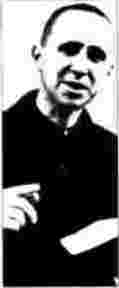
Brecht pointing out the real criminals
Reviews, Socialist Review, No. 182, January 1995, pp. 27–28.
Copyright © Socialist Review.
Copied with thanks from the Socialist Review Archive at http://www.lpi.org.uk.
Marked up by Einde O’Callaghan for the Marxists’ Internet Archive.
 |
|
Brecht pointing out the real criminals |
The Threepenny Opera
by Bertolt Brecht and Kurt Weill
I went to see this new staging of the most famous collaboration between the left-wing German playwright Bertolt Brecht and the composer Kurt Weill with high expectations. I came away very disappointed.
The translation of the song lyrics was the best I’ve come across, making political points that are usually lost in other renderings. The singing was often brilliant. The technical props were very cleverly designed. Yet the final product just did not cohere, with the action often dragging and failing utterly to measure up to the pungency of many of the songs.
The Threepenny Opera is a musical rather than a conventional opera. The story line centres upon various sections of the London criminal classes – Peachum, the respectable petty bourgeois who profits from exploiting beggars, MacHeath, the leader of a gang of thieves, the captain, the corrupt police chief.
The criminals mimic the behaviour of high bourgeois society, plot against each other and shop one another to the police. The point, for Brecht, was to show that there was not a difference in essence between the bourgeoisie and the cold blooded thief and murderer – except the bourgeoisie know how to avoid direct implication in their crimes. As the most famous Brecht-Weill song puts it, ‘The shark bites with his teeth/ scarlet billows start to spread/ fancy gloves, though, wears MacHeath/ and there’s not a trace of red’.
But there always seem to have been problems getting productions of The Threepenny Opera to put this point across clearly. Brecht worked on the play in the late 1920s shortly before he became a full blown Marxist and, setting it in Victorian London, did not use it to make direct contemporary political comment. This meant well-heeled theatre audiences could always see it just as a farce about gangsters. As one of Brecht’s biographers, Ronald Hayman, says, ‘The well dressed entrepreneurs in the stalls could feel comfortably superior to the robber gangs that aped the social pretensions of the nouveaux-riches.’
The very success of the work served further to emasculate its political points, as it became a modern classic which merited sumptuous productions designed to give value for money to those who could afford £30 a seat.
This new production seeks to overcome these problems by setting the action in Britain in the near future, with television screens broadcasting Crime Watch programmes and a special Evening Standard on MacHeath’s arrest. But the good intentions come to little as a result of poor acting and sloppy stage work. Peachum and his wife do not come across as respectable petty bourgeois. MacHeath and his gang are not convincing caricatures of 1930s villains, let alone of 1990s villains who ape the rich. The performances of the captain and his police falter. The end result is a spectacle without political content, a series of extremely good songs interspersed with not particularly funny farce.
It is a shame, because Britain today is remarkably like the world caricatured by Brecht 65 years ago. There are thousands of beggars. There are hordes of corrupt police chiefs. There are crooked politicians. There are supercriminals of the Maxwell variety that go unpunished. And there are big businessmen who trade in wholesale murder. Never have much of the respectable bourgeoisie and the nastier section of the criminal classes been so alike. And never would a successful musical that made these points be more relevant.
As it is, it is worth going to the Donmar to hear the songs. But if you want to get the point of the whole operation, you will need to read the excellent Threepenny Novel (Penguin, £6.99) written by the Marxist Brecht four years after the first stage performance.
The Threepenny Opera plays at the Donmar Theatre, London, until March.
Last updated on 3 November 2019